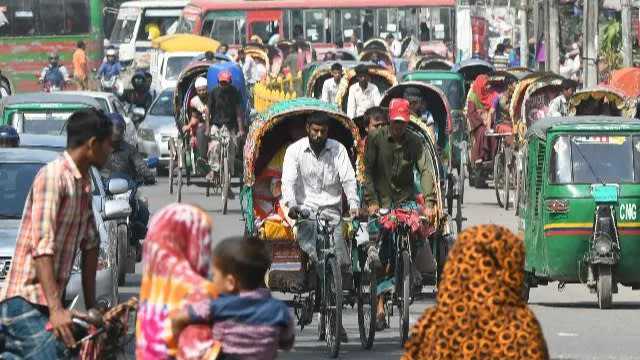Bangladesh's VAT rollout confuses consumers and businesses

Image collected
Raihan Khan, owner of a small diner selling rice and paratha flatbread dishes in Dhaka, has no idea how to deal with Bangladesh's rollout of a new value added tax on Monday.
"We don't have a machine," the bearded restaurateur said, referring to electronic cash registers. "If I hike prices, I have to wrangle with customers."
Khan, whose average daily sales total about $300, said he is not prepared to calculate sales electronically, and was unaware that he should add 7.5% to customers' bills. Until now, he had paid a lump sum levy known as a package VAT.
Asia's fastest growing economy -- projected to have expanded 8.13% in the fiscal year ended June -- is also one of the least-taxed in the world. The South Asian nation introduced the new levy two years after neighboring India rolled out its own goods and services tax.
The move is an attempt to raise revenue while satisfying the International Monetary Fund's demand that it put its finances in order.
The country's tax to gross domestic product ratio has hovered at just over 10% since 2014 -- half India's rate of 20.3%, according to a government report based on IMF data.
Bangladesh had originally planned a unified VAT of 15%, but the government relented under pressure from the business community. The country has now introduced an eight-level VAT, with four main levies of 5%, 7.5%, 10% and 15%.
It is not just shopkeepers like Khan who are struggling with the tax. Bigger businesses are also complaining about not receiving clear guidelines on the new VAT.
"We're still studying the impact ... but prices of rods will go up," said Manwar Hossain, chairman of the Bangladesh Steel Manufacturers Association. Hossain estimated that prices will rise more than $41 per metric ton.
Shaheen Ahmmed, chief executive officer of fashion house Anjan's, worries that fewer shoppers will come to his stores.
"Prices of products will rise. Our sales will shrink," said the employer of some 200 people at two dozen outlets nationwide.
The government set an ambitious revenue target of $38.5 billion in the fiscal 2020 budget, with one third of this projected to come from VAT.
Unveiling the fiscal blueprint last month, Finance Minister A.H.M. Mustafa Kamal said authorities have initiated a string of reforms to boost collection of VAT. These include administrative reforms, widening the tax net, making tax identification mandatory for receiving utility services, and encouraging taxpayers to submit returns.
The National Board of Revenue is in the process of digitizing its VAT operations, he said.
Siddiqur Rahman, vice president of the Federation of Bangladesh Chambers of Commerce and Industry, said there will be some teething problems, but a joint committee comprised of members from the federation and NBR is working to address outstanding issues.
"Already, the government has lifted advance tax on the import of capital machinery after we expressed our concerns," he told the Nikkei Asian Review.
Rahman said the business community fully supports the new VAT because it will strengthen government's ability to ramp up spending on infrastructure and private sector development.
The VAT law was enacted in 2012 as a condition of the country receiving a $1 billion credit line from the IMF, which continues to advise on tax reform.
"We would advocate a shift away from trade taxation toward taxation of consumption, personal income, corporate income and property tax," Ragnar Gudmundsson, Bangladesh's representative at the IMF, told Nikkei.
"Such a shift has been instrumental in ensuring the success of sustained revenue mobilization efforts" in other countries, he said, adding that Bangladesh should broaden the tax base and ensure compliance through risk-based auditing.
But economists say the new tax will not boost revenue without administrative overhauls.
"I'm not hopeful about a revenue increase," said Ahsan H. Mansur, executive director at the Policy Research Institute, a Dhaka-based think tank. "The implementation of the law will be bad."
Khandaker Ruhul Amin, president of the Bangladesh Restaurant Owners Association, said businesses are not yet ready for the online system.
While enterprises with an annual turnover below $59,000 will get exemptions from paying VAT, this ceiling is not applicable to the hospitality industry, he said.
"How will they determine the ceiling?" asked Amin. "There are complex issues. Many things remain unclear."
In addition to businesses and government, consumers like garment worker Shapla Akter are bracing for the effect of the new VAT.
One of eight siblings, Akter fled poverty in northern Mymensingh district by moving to the capital last year to work in Bangladesh's booming textiles industry. The 20-year-old now lives with her husband in a single room of a two-story iron and concrete shanty in downtown Dhaka.
Stitching denim bottoms for Primordial Ltd, a Dhaka apparel maker, she makes $106 a month and is unhappy that a 7.5% tax will be slapped on her dresses, which cost about $6 each.
"It will pile pressure on us," Akter said. "We're poor. The government should take measures so that we can spend less."
Source: https://asia.nikkei.com
Previous Story
- Stop harassment over VAT collection
- ‘Creation of new entrepreneurs must for sustainable economy’
- Advance tax on imports to raise cost of...
- SMEs for reducing of import duties in next...
- Construction sector against any tax, VAT hike
- High production cost a bar to ceramic exports
- Construction sector looks to thrive on higher demand
- Japan commits to help boosting Bangladesh agriculture: Razzak